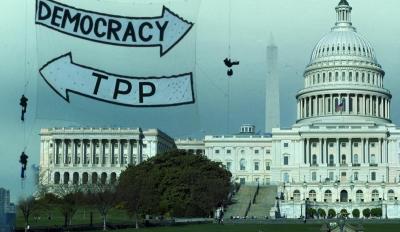
The Trans Pacific Partnership Agreement (TPP) is being touted as a “21st century” trade agreement that will contain strong and enforceable labor standards to ensure our trade partners honor their promise to uphold workers’ fundamental rights.
But if history is any guide, labor rights advocates should remain deeply skeptical of any such claims.
Legislation introduced in April aims to provide the President with trade promotion authority (aka “fast track”), a procedure that requires Congress to vote on proposed trade deals with limited debate and no opportunity to offer amendments.
ILRF has joined a coalition of over 2000 labor, environmental, family farmer, and faith organizations in signing a letter opposing fast-track as an undemocratic tool that has been used to shove unbalanced trade deals (including NAFTA and CAFTA-DR) through Congress without sufficient public scrutiny or debate.
The move to pass fast-track is widely seen as an attempt to boost the prospects of the Trans-Pacific Partnership (TPP), the Obama Administration’s proposed mega trade deal involving the United States and 11 different countries, including Japan, Mexico, Malaysia, Peru and Vietnam.
The negotiation of the TPP has been shrouded in secrecy and the text of the agreement has never been made public. If the lack of transparency is not enough of a warning sign, a quick review of what we do know about the trade deal raises serious concerns:
- Undue corporate influence: While the public and the press have been kept in the dark, a select group of over 500 corporate “advisers” have been given special access to the text, even drafting provisions on intellectual property and other controversial issues.
- Weak environmental protections: The Sierra Club, WWF, and NRDC have all expressed concerns that the TPP’s environmental chapter is weaker than previous agreements and will include commitments that are not enforceable through dispute resolution.
- New rights for corporations: The TPP will reportedly provide multinational corporations with the right to sue states over alleged acts of discrimination that reduce their profits. Using similar rights in other FTAs, multinationals have filed over 600 cases against over 100 governments, challenging everything from clean water laws to an increase in the minimum wage. All of these investor-state disputes are heard in private tribunals closed to the public.
- Bad for development: Oxfam other development groups warn that intellectual property and pharmaceutical pricing provisions are a step backward for public health, reducing developing nations’ access to life-saving medications. They also raise concern about how the agreement’s provisions on agricultural market access will hurt small farmers in developing nations and threaten food security in rural areas.
In addition, FTAs have a very weak track record at best in securing better worker rights protections in our partner countries. So arguments that the TPP will improve labor rights abroad ring hollow.
How FTAs have let workers down
In 2005, during Congressional debate over DR-CAFTA, the USTR touted the agreement’s enforceable labor chapter as a key reason why members of Congress could be sure that Guatemala, Honduras, and other Central American countries would honor their promise to enforce their own labor laws.
In 2008, this commitment was put to the test when the AFL-CIO and Guatemalan unions filed a complaint under DR-CAFTA that documented the Guatemalan government’s systematic failure to enforce its labor laws. Based on our research, the U.S. government’s review of the complaint has been characterized by delays and an apparent lack of political will to sanction the Government of Guatemala. Over six years later the complaint is still pending and Guatemalan workers are no closer to enjoying their basic labor rights at work.
Unfortunately, the chronic delays associated with the Guatemala complaint appear to be the rule instead of the exception. In 2014, a GAO report found major weaknesses in the U.S. government’s monitoring and enforcement of labor standards in free trade agreements, particularly in failing to investigate complaints in a timely manner. The GAO review concluded that the labor standards in FTAs have not led to meaningful improvements in working conditions overseas.
The TPP's labor issues
The weakness of FTA labor complaint mechanisms to date should embolden policymakers to insist that potential trade partners address serious labor rights violations before joining the TPP, not after. This is especially true given the severity of the labor and human rights abuses occurring in several of the proposed TPP members:
- Malaysia has well-documented, severe problems with the abuse of migrant workers, including widespread forced labor and human trafficking. Just last year the State Department’s Trafficking in Persons Office downgraded Malaysia to a “Tier 3” country, the lowest possible rating, meaning the government “does not fully comply with the minimum standards and is not making significant efforts to do so.”
- Vietnam remains one of the most authoritarian governments in the world, denying its citizens basic political freedoms, including free speech and the right to organize. Independent, democratic trade unions are not allowed and its minimum wage hovers around 60 cents an hour. According to the U.S. Department of Labor, child labor is common in the production of garments, a sector that will likely expand under the preferential treatment it is likely to receive under the TPP. The government even runs a system of drug detention centers where alleged drug addicts are locked up for years without a trial and subjected to forced labor, producing goods for private companies, some of which is being imported to the United States.
- Peru maintains several “special” labor regimes which allow employers to hire workers on temporary, renewable contracts, effectively undermining their right to organize. In its textile and garment export industry, tens of thousands of workers have been working for years on a series of short-term contracts, producing clothing for major brands like GAP, Abercrombie & Fitch, and New Balance. Employers in this sector routinely discriminate against union members by refusing to renew their short-term contracts, a practice reflected by poverty wages and low rates of union membership.
These are not minor compliance issues; rather, they are systematic abuses of fundamental labor rights that will place these countries severely out of compliance with the TPP labor chapter on day one.
Everything we know about the TPP suggests the agreement is badly flawed and deserves more public scrutiny, not less. As it stands, the agreement needs to be carefully reviewed and debated, not rubber stamped via “fast track.”

